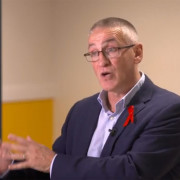Today we launch our new report – HIV in England: Addressing areas of unmet need and reducing numbers of people with transmissible levels of HIV.
The report reiterates that we have all the tools needed to end HIV transmissions by 2030, and that we could even be the first country to meet this global goal, not least by the effectiveness of innovative HIV testing strategies, such as opt-out HIV testing in emergency departments and postal HIV testing.
However, despite progress it's clear that there are still areas of unmet need, which means HIV continues to disproportionately impact certain populations, and late diagnoses are still all too common.
The latest stats from the UK Health Security Agency (UKHSA) are concerning. While HIV testing rates among gay and bisexual men have recovered to pre-pandemic levels, the same can't be said for heterosexual people. In addition, more people were diagnosed late in 2021 compared with 2019 and 2020, and there continues to be too many missed opportunities to test and too many people living with HIV lost to care. The message is clear: we need to do more to address areas of unmet need.
Thanks to the commitment of our supporters – and our partnership with National AIDS Trust and Elton John AIDS Foundation (EJAF) – we won £20 million from the Department of Health and Social Care and NHS England to roll out opt-out testing beyond the areas piloted by EJAF.
The initial findings from the first 100 days of opt-out blood-borne virus (BBV) testing has shown remarkable results: 102 people have been newly diagnosed with HIV and 60 people have been re-connected to a HIV clinic. Innovations like this, as well as ‘click and collect’ services alongside postal HIV testing, are working but there are still gaps that we must address.
Quote textThis report is a call for action to ensure no one is being left behind.

The key tool we have is HIV treatment itself. With one, sometimes two or three, pills a day a person living with HIV can achieve an undetectable status. This means that HIV is not attacking the immune system and it also means HIV can't be passed onto anyone else.
However, becoming and staying undetectable is not always easy for everyone. It's impacted by many factors including poverty, poor mental health, access to clinics, and drug and alcohol issues. Therefore, we must remain cautious about drawing conclusions from data showing the number of people who have achieved an undetectable viral load. We can't assume that, once diagnosed and linked to care, people always stay in care and remain virally supressed.
At the end of 2019, there were roughly equal numbers of people that were undiagnosed and diagnosed but not yet virally suppressed - about 7,000 in each. In the two years that have followed this has taken a surprising turn. As quick as HIV testing is bringing down the undiagnosed number, the changes brought about by COVID-19 are seeing more people lost to care and those diagnosed with a detectable viral load.
This level of disengagement means HIV is attacking the immune system of too many people and is able to be passed on to others. The opportunistic infections and onward transmission from this group are wholly preventable. This situation is infuriating and a mark of failure in the post-COVID recovery.
This report is a call for action to ensure no one is being left behind as we move closer to ending HIV transmissions in this country. We want Government, commissioners, UKHSA and the NHS in England to embrace the recommendations and innovations we champion.
Together we can end new cases of HIV and ensure people living with HIV live well. But we need to make every contact count.
Ian Green is Chief Executive of Terrence Higgins Trust.



